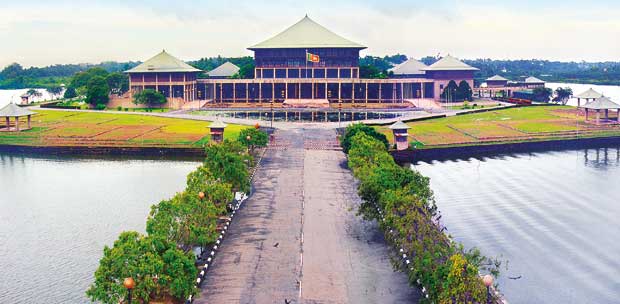Reply To:
Name - Reply Comment
Last Updated : 2024-04-26 02:12:00

Patron client politics, informal social networks and corruption have been mostly responsible for the weakening of rule-based systems of decision making and allocation of scarce public resources in Sri Lanka. Today, many people consider getting around formal rules as near normal and perceive anyone trying to follow the rules to the letter as utterly out of touch with reality. At the end of the day, most people want to get their things done, no matter how. On the other hand, liberally minded intellectuals and progressive social and political activists  have been arguing for policies and systems that would ensure equal opportunities and combat discrimination and social injustice. But the actual practices, both on the part of citizens and the decision makers, continue to be shaped by ground realities that often do not favour rule based systems. Yet, what should be recognized is that there are several well-functioning rule based systems and that there are many who are passionate about the need to have such just and formal systems.
have been arguing for policies and systems that would ensure equal opportunities and combat discrimination and social injustice. But the actual practices, both on the part of citizens and the decision makers, continue to be shaped by ground realities that often do not favour rule based systems. Yet, what should be recognized is that there are several well-functioning rule based systems and that there are many who are passionate about the need to have such just and formal systems.
Widespread indiscipline on our roads make people insecure, tense, agitated and aggressive, no doubt undermining their civility and psychological health, besides leading to fatal accidents
The Youth Commission Report of 1991, compiled after violent youth protests in the late 1980’s, recognized the corrosive effects of the infamous chit system operating at the time to guide the allocation of much valued government jobs and proposed its abolition. The incumbent President accepted the recommendation and introduced competitive examinations instead. Recruitment of SLAAS officers has long been on the basis of a competitive examination and almost everyone accepts it as equitable and just. Another example for a good rule based system of allocation of a scarce resource is the system of university admissions. In other words, it is possible to introduce and maintain a few rule based systems even in a country where corruption, political patronage and informal social networks continue to guide the allocation of public resources among citizens in such wide ranging areas like justice, law enforcement, employment, construction contracts, school admissions and deployment of state functionaries. Reasons for this situation are many and the main one is that many people want to achieve their life goals rather than join the liberal social and political activists to change the system. Of course, when a well-functioning, rule based system is established, they will fall in line and abide by the rules. Until then, they will either continue to pay homage to politicians or bribe whoever who promises to get what they want done. The situation that prevails in the country today is not a sudden development or entirely the result of the decline of political standards. Family and informal social networks have influenced even private sector employers when they recruited persons for lucrative white collar jobs. This was well known in the plantation sector. On the other hand, schoolboy networks have helped many people to find employment in both private and public sector institutions as well as to get their children admitted to privileged schools. In more recent years, political patronage became a major factor influencing the allocation of public resources among politically connected beneficiaries.
"It is quite clear that corruption has come up as a big issue again. Given the fact that corruption of the previous regime was a major political slogan that helped the leaders of the present regime to get considerable political mileage"
Allocation of public resources through social and political networks leads to discrimination and exclusion of many people who are not connected to such networks. The excluded persons are usually political opponents or socially marginalized people. Rule based systems can not only safeguard their interests but also prevent some of the aggrieved from violently revolting against regimes that perpetuated unjust and discriminatory practices. Sri Lanka’s past youth revolts were partly motivated by such practices as the 1991 Youth Commission report attested.
Despite the positive experience with respect to rule based systems on one hand and the negative effects of unjust and discriminatory practices mentioned above on the other, many people seem to have an indifferent attitude towards them. This is the reason why many negative practices have gradually returned and threaten to weaken or undermine rule based systems. There is enough evidence pointing to this fact. Yet, the authorities do not seem to have taken this disturbing trend seriously. If we look at its adverse economic, social and political implications, it is hard to imagine how such a trend could be treated lightly.
It is quite clear that corruption has come up as a big issue again. Given the fact that corruption of the previous regime was a major political slogan that helped the leaders of the present regime to get considerable political mileage, the incumbent regime will have little chance of surviving the next electoral test if no decisive action is taken to arrest the trend.
It is true that many people have a tendency to use their social and political capital to access diverse forms of public resources but those who are left out or negatively affected in the process naturally become disillusioned and agitated. Often the latter group is larger than the one that benefits from social and political favouritism and corruption. On the other hand, , those who extend favours to people based on social and political connections do not realize or do not care that many citizens become resentful of the govt that allows this to happen. Perhaps the most significant social implication of the undermining of rule-based systems of governance is the gross indiscipline it breeds. For instance, the vehicle drivers who violate traffic rules and get away by using personal connections or bribing Police officers become even more undisciplined because they know that they can continue to get away after violating the rules.
Allocation of public resources through social and political networks leads to discrimination and exclusion of many people who are not connected to such networks
Widespread indiscipline on our roads make people insecure, tense, agitated and aggressive, no doubt undermining their civility and psychological health, besides leading to fatal accidents.
Violation of rules under the influence of corruption and informal social and political interference in many other spheres undermines public trust in formal institutions and rule of law. This is certainly not an environment conducive for promoting peace, non-violence, rule of law and social justice, all of which are key elements of good governance. In fact, such an environment can produce the exact opposite over time as we have witnessed in this country over the last several decades.

Add comment
Comments will be edited (grammar, spelling and slang) and authorized at the discretion of Daily Mirror online. The website also has the right not to publish selected comments.
Reply To:
Name - Reply Comment
US authorities are currently reviewing the manifest of every cargo aboard MV
On March 26, a couple arriving from Thailand was arrested with 88 live animal
According to villagers from Naula-Moragolla out of 105 families 80 can afford
Is the situation in Sri Lanka so grim that locals harbour hope that they coul